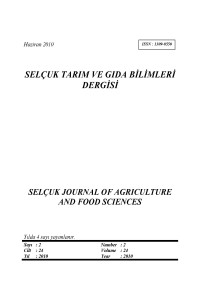Effect of Low- Protein Diets Supplemented With Individual Amino Acids on Performance, Reproductive Characteristics and Nitrogen Excretion in Breeding Chukar Partridge (Alectoris chukar)
Abstract
An experiment was conducted to determine the influence of low-protein diets supplemented with amino acid con-centration on the performance, reproductive characteristics and nitrogen excretion in breeding chukar partridge. In the experiment, 72 breeding chukar partridge at 36 weeks of age (male/female ratio: 1/ 2) was fed diets having 17, 13 % crude protein (CP) without and with supplemental methionine, lysine and threonine (total of 3 treatments) during the 18 weeks. The low-protein diets (13 % CP) were equalized to control diet supplemented with methionine, lysine and threonine to increase their concentration to a level equivalent to control diet (% 17 CP). Each of the experimental diets was fed four replicates with 6 chukars per replicate. Feed and water were continuously available and light was provid-ed for 16 hours per day. There were no significant differences among the treatment groups in average body weight changes, feed intake, egg production, egg weight, egg mass and percentage of fertility and hatchability (P>0.05). Decreasing dietary protein levels resulted in a significant (P< 0.01) decrease in nitrogen excretion. The results of the current study indicate that it is possible to obtain performance of breeding chukar partridge fed with low-protein diet (13 %) without any supplemental essential amino acids and to get comparable result with performance of chukars fed diets containing conventional (17 %) protein levels.
Damızlık Kekliklerde (Alectoris chukar) Düşük Seviyede Protein İçeren Rasyonlara Bireysel Amino Asit İlavesinin Performans, Üreme Özellikleri ve Nitrojen Boşaltımına Etkisi
Abstract
Damızlık kekliklerde düşük seviyede protein içeren ve amino asit ilave edilmiş rasyonların performans, üreme özellikleri ve nitrojen boşaltımına etkisini tespit etmek için bir araştırma yapılmıştır. Araştırmada, 36 haftalık yaşta 72 adet damızlık keklik (erkek/dişi oranı:1/2) 18 hafta boyunca % 17 (Kontrol), 13 ve 13 ham protein + ilave lisin, metiyonin ve treonin içeren 3 farklı rasyonla yemlenmişlerdir. Düşük ham protein içeren (% 13) rasyona, kontrol rasyonu ile eşit olacak şekilde lisin, metiyonin ve treonin ilave edilmiştir. Her bir muamele 4 tekerrürlü olarak denenmiş ve her bir tekerrürde 6 adet keklik kullanılmıştır. Yem ve su ad-libitum olarak verilmiş ve günde 16 saat aydınlatma yapılmıştır. Deneme rasyonları kekliklerin deneme sonu ortalama canlı ağırlık değişimi, yem tüketimi, yumurta verimi, yumurta ağırlığı, yumurta kitlesi, döllü yumurta %’ si ve % kuluçka çıkış gücü değerlerini önemli olarak etkilememiştir (P>0.05). Bununla beraber rasyon ham protein seviyesinin düşürülmesi, gübre ile atılan nitrojen miktarını önemli derecede azaltmıştır (P<0.01). Bu araştırmanın sonuçları damızlık kekliklerin % 13 ham protein içeren rasyonla, bireysel amino asit ilavesine gerek kalmadan beslenebileceğini ve klasik (% 17 ham protein içeren) rasyonlarla beslenen kekliklerle mukayese edilebilecek performans sonuçlarının alınabileceğini göstermiştir.
Keywords
Details
| Primary Language | English |
|---|---|
| Subjects | Zootechny (Other) |
| Journal Section | Research Article |
| Authors | |
| Publication Date | June 25, 2010 |
| Submission Date | January 1, 2010 |
| Published in Issue | Year 2010 Volume: 24 Issue: 2 |
Cite
Selcuk Agricultural and Food Sciences is licensed under a Creative Commons Attribution-NonCommercial 4.0 International License (CC BY NC).

